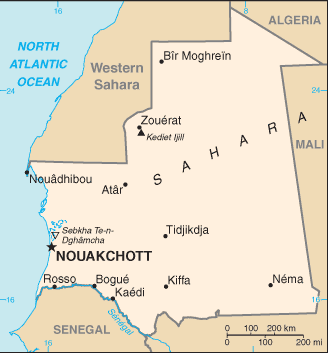 |
usa | world | animals | vocabulary | health | science | math | history |
Mauritania Map Courtesy CIA World Factbook
From the 3rd to 7th centuries, the migration of Berber tribes from North Africa displaced the Bafours, the original inhabitants of present-day Mauritania and the ancestors of the Soninke. The Bafours were primarily agriculturalist, among the first Saharan people to abandon their historically nomadic lifestyle. With the gradual desiccation of the Sahara, they headed South. Following them came a migration of not only Central Saharans into West Africa, but Berbers (North Africans of predominantly Middle Eastern ancestry) and Arabs as well. By the Eleventh Century AD, the once small Bafour people had grown into a very large and wealthy Soninke empire - Ghana, which stretched from Mauritania into the neighboring states of Senegal and Mali. Likewise, in the North, the Arab-Berber population had achieved an impressive empire of their own, the territory of which stretched across the Mediterranean into Spain and Portugal. Local nomadic Berber tribes, on the other hand, though influential, remained largely without power, having been conquered by the Soninke. In 1076, Islamic warrior monks (Almoravid or Al Murabitun) attacked and conquered the ancient Ghana Empire. Over the next 500 years, Arabs overcame fierce resistance from the local population (Berber and non-Berber alike) and came to dominate Mauritania. The Mauritanian Thirty-Year War (1644-74) was the unsuccessful final effort to repel the Yemeni Maqil Arab invaders led by the Beni Hassan tribe. The descendants of the Yemeni Beni Hassan warriors became the upper stratum of Moorish society. Berbers retained influence by producing the majority of the region's Marabouts — those who preserve and teach Islamic tradition. Many of the Berber tribes proclaimed the origin of Yemen (as they sometimes did an Arab one); there is yet little evidence to suggest this, though some studies do link a connection between the two. Hassaniya, a mainly oral, Berber-influenced Arabic dialect that derives its name from the Yemeni Beni Hassan tribe, became the dominant language among the largely nomadic population. Aristocrat and servant castes developed, yielding "white" Moors (the aristocracy), kewri (the indigenous peoples who were never enslaved), and "black" Moors or haratin (the formerly enslaved). French colonization at the beginning of the 20th century brought legal prohibitions against slavery and an end to interclan warfare. During the colonial period, the population remained nomadic, but many sedentary peoples, whose ancestors had been expelled centuries earlier, began to trickle back into Mauritania. As the country gained independence in 1960, the capital city Nouakchott was founded at the site of a small colonial village, the Ksar, and 90% of the population was still nomadic. With independence, larger numbers of the indigenous peoples (Haalpulaar, Soninke, and Wolof) entered Mauritania, moving into the area north of the Senegal River. Educated in French language and customs, many of these recent arrivals became clerks, soldiers, and administrators in the new state. Moors reacted to this change by increasing pressure to Arabize many aspects of Mauritanian life, such as law and language. A schism developed between those who consider Mauritania to be an Arab country (mainly Moors) and those who seek a dominant role for the non-Moorish peoples. The discord between these two conflicting visions of Mauritanian society was evident during intercommunal violence that broke out in April 1989 (the "1989 Events"), but has since subsided. The tension between these two visions remains a feature of the political dialogue. A significant number from both groups, however, seek a more diverse, pluralistic society.
|
||||||
 The Islamic Republic of Mauritania is a country in northwest Africa. Its coast faces the Atlantic Ocean on the west, with Senegal on the south-west, Mali on the east and south-east, Algeria on the north-east, and the Moroccan-annexed territory of Western Sahara on the north-west. The capital and largest city is Nouakchott, located on the Atlantic coast. It is named after the ancient Berber kingdom of Mauretania.
The Islamic Republic of Mauritania is a country in northwest Africa. Its coast faces the Atlantic Ocean on the west, with Senegal on the south-west, Mali on the east and south-east, Algeria on the north-east, and the Moroccan-annexed territory of Western Sahara on the north-west. The capital and largest city is Nouakchott, located on the Atlantic coast. It is named after the ancient Berber kingdom of Mauretania.